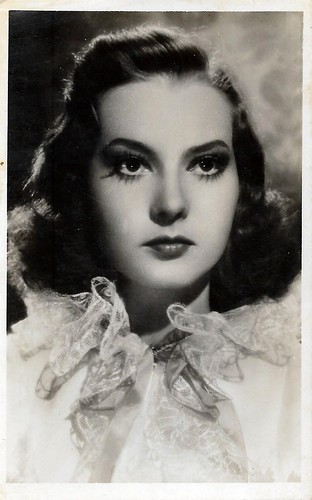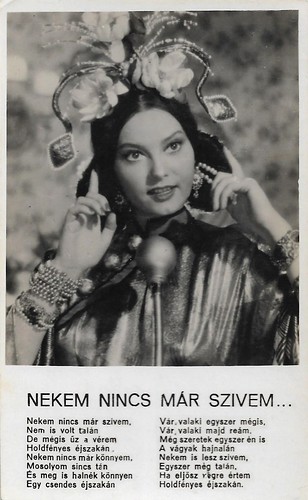
Hungarian postcard by Filmbolt. Photo: Z. Horvath-Imago Film. Zita Szeleczky in Leányvásár (1941).

Hungarian postcard by Filmbolt. Photo: Hunnia-Takacs Film. Zita Szeleczky in Egy éjszaka Erdélyben/A Night in Transylvania (Frigyes Bán, 1941).

Hungarian postcard by Magyar Filmiroda. Photo: Bethlen Gabor/Colosseum-Atelier-film. Zita Szeleczky in Tentazione (1942).
Leading in 26 Hungarian films
Zita Szeleczky was born Szeleczky Zita Klára Terézia in Nekézseny, Hungary, in 1915 as the daughter of Manó Szeleczky (Emmánuel) and Amália Négyessy.
She graduated from the Veres Pálné Gymnasium in Budapest in 1933 and from the Academy of Drama in 1937. She became a scholarship holder and then a full member of the National Theatre (1936-1941).
In addition to Hungarian plays, Szeleczky acted in plays by William Shakespeare ('Romeo and Juliet'), Molière ('Tartuffe'), Henrik Ibsen ('Rosmersholm', 'Peer Gynt'), Dario Niccodemi, and Luigi Pirandello.
From 1936 to 1944 Zita Szeleczky played the leading female roles in 26 Hungarian films, mostly musical comedies. She also became a regular at Hungary’s Nazi rallies and was the darling of the Arrow Cross. Szelecky started her film career with Bela Balogh's Méltóságos kisasszony/The Superior Mother (Bela Balogh, 1936-1937).
She followed her debut with such films as Fekete gyémántok/Black Diamonds (Ladislao Vajda, 1938) with Pál Jávor, Azurexpress/Azure Express (Bela Balogh, 1938) with Antal Pager, and Beszállásolás/Billeting (Sándor Szlatinay, 1938) again with Pager. The latter was screened at the Venice Film Festival.
With Javor and Pager, she starred in A varieté csillagai/Stars of Variety, the alternate Hungarian language version of Menschen vom Variete (Josef von Báky, 1939). Then she appeared in Karosszék/The Armchair (Béla Balogh, Kálmán Nádasdy, 1939) with Gábor Rajnay and László Szilassy, and the historical comedy Egy éjszaka Erdélyben/A Night in Transylvania (Frigyes Bán, 1941) with Pager.
In 1942 she starred in one Italian film, Tentazione/Temptation by Aldo Frosi and Hans Hinrich, with Otello Toso in the male lead. Szeleczky's last fiction film in Hungary during the war was Nászinduló/The Wedding March (Zoltán Farkas, 1944) with László Szilassy.

Hungarian postcard by Magyar Filmiroda, Budapest, no. 6218. Photo: Bethlen Gabor. Zita Szeleczky in Karosszék (1939).

Hungarian postcard by Magyar Filmiroda, no. 6353. Photo: Bethlen Gabor.

Hungarian postcard by NIF Palatinus / Filmbolt. Zita Szeleczky in Karosszék (Béla Balogh, Kálmán Nádasdy, 1939). The caption translates 'I don't like love'.
A Hungarist Evening
On 8 June 1940, Zita Szeleczky married Gyula Haltenberger, a mechanical engineer three years her senior and a sympathiser of the fascist movement and the Szálasi-regime. In 1942-1943, she was engaged by the Budapest Operetta Theatre.
In early 1944, she made a guest appearance at the Madách Theatre. On 16 April 1945, the Budapest daily A Reggel reported that she had committed suicide in Sopron. Gyula Haltenberger, who was arrested by the political department of the Buda police, confirmed this information, which later proved to be a fake.
In 1945, Szeleczky left the country and was convicted in absentia by the People's Court for her wartime behaviour, among other things because in November 1944, in the context of a so-called "Hungarist Evening", she recited a Petőfi poem entitled "Up to the Holy War!", which was broadcast by Hungarian Radio.
She first lived in Austria and Italy, then moved to Argentina in 1948, where she initially performed in the Hungarian Dramatic Society . She also played a supporting part in the Argentine film Vivir un instante/Julia (Tulio Demicheli, 1951) under the stage name Diana Toldy. It was her final film.
Between 1949 and 1974, she visited Hungarian communities all over the world with her own shows. She did operettas, poetry recitals and variety shows.

Hungarian postcard by Filmbolt, no. A.149. Photo: Kárpát-Film. Zita Szeleczky in Eladó birtok (1941).

Hungarian postcard by Filmbolt, no. A.180. Photo: Terra Film. Zita Szeleczky and Janos Sardy in Leányvásár (1941).

Hungarian postcard by Filmbolt, no. A.279. Photo: Kárpát-Film. Zita Szeleczky in Eladó birtok (1941).
Full rehabilitation
In 1962, Zita Szeleczky moved to the United States, where she married an American of Hungarian origin, Paul Illés. The marriage didn’t last, but she could stay in California. In the US, she almost immediately made contact with novelist Albert Wass. Their correspondence reveals that they subsequently worked closely together in the service of the universal Hungarian cause.
She also released several recordings. While with her attractive looks, stage presence, and intelligent and natural acting, she portrayed young girls, lyrical heroines and naïve women in her short career in Hungary, she expanded her performing activities in emigration into a cultural mission.
In 1974 she married an Australian actor, Sándor Novák. That marriage did not last either. In the autumn of 1988, she returned to her homeland and lived in Érd. In 1993, the Supreme Court acquitted her of trumped-up charges from 1947 and granted her full rehabilitation. Later that year, together with Albert Wass, she was awarded the Order of Merit of the Republic of Hungary.
Zita Szeleczky died on 12 July 1999, aged 84, childless. In accordance with her will, she was laid to rest in the family crypt in Nekézseny. In 2007 she was awarded the Hungarian Heritage Award posthumously. The Hungarian Postal Service issued a stamp commemorating the 100th anniversary of Szeleczky in 2015.
György Lázár, a Hungarian emigrant in the USA, writes on the site Hungarian Free Press that he was disturbed that the Hungarian Postal Service issued the stamp. He writes that Szeleczky's support of Hungarian fascism was "nothing less than shameful" and blames the actress for her involvement in the Hungarista movement. Lázár thinks that the stamp is "another example of the Orbán Government’s relentless drive to whitewash wartime fascists and rewrite history". However, Szeleczky saw herself as an entertainer who strove to boost the morale of the troops, performing at the front and in hospitals for the wounded soldiers.

Hungarian postcard by Magyar Filmiroda. Photo: Bethlen Gabor. Zita Szeleczky in Egy éjszaka Erdélyben/A Night in Transylvania (1941).

Hungarian postcard by Ed. Tempo Budapest. Zita Szeleczky in Sziámi macska (László Kalmár, 1943). The caption translates as 'The women of Pest don't have a partner.'

Hungarian postcard by Ed. Tempo, Budapest. Zita Szeleczky in Sziámi macska (1943). The caption translates as 'I no longer have a heart...'.

Hungarian postcard.
Sources: György Lázár (Hungarian Free Press), Wikipedia (Hungarian and English), and IMDb.
No comments:
Post a Comment